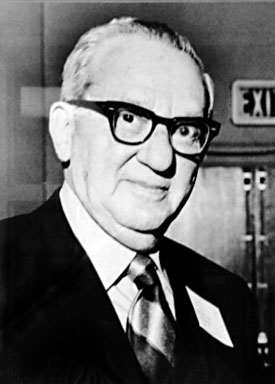William Engel
William Perry Engel (born September 23, 1895 in Cottondale; died October 13, 1974) was a real estate executive and developer and founder of Engel Realty Company which he turned over to his son, Marvin.
Engel was the son of Michael and Sophia Kronenberg Engel of Tuscaloosa County. The family relocated to Birmingham in 1902. Engel attended Birmingham City Schools and entered Wheeler Business College while working as an attorney's secretary.
In 1917 Engel began working as a traveling sales representative for the Portland Cement Company. Soon later, with the U.S. entrance into World War I he attended Officer's Training Camp at Fort McPherson, earning his commission as a First Lieutenant on December 31 of that year. In the spring Engel took command of a field artillery battery in France and remained there through the summer. He was discharged in March 1919 with the rank of Captain. After returning to Birmingham, he began working in real estate and insurance sales, growing the Engel Realty Company, Engel Mortgage Company and Engel Agency into a major business organization.
Engel was also a director of the Birmingham Trust National Bank, the Protective Life Insurance Company and Children's Hospital, and president of the Birmingham Real Estate Board and the Eye Foundation Hospital's building committee. He also served on the board of the Warrior-Tombigbee Development Association and on development committees for the Salvation Army and Howard College's "New Campus Building Fund".
Engel was active on civic boards, as well, chairing the Birmingham Community Chest in 1948-1949 and serving on the Downtown Improvement Association and the inaugural Birmingham Committee of 100. He served thirteen years as president of the Young Men's Hebrew Association and steered the group toward the eventual construction of the Levite Jewish Community Center. He chaired the United Jewish Fund and was president of Temple Emanu-El from 1948 to 1950. He served as Alabama State Chair of the United Jewish Appeal that assisted in the settlement of the "Jewish National Home" following the Arab-Israeli War. He continued to raise money for Israel over the next decade, including $120,000 raised during just one speech in which he proclaimed that, "there is no possible excuse for an substantial American not giving and giving to the limit."
For his efforts as a civic booster, especially through the recruitment and publicity efforts of the Committee of 100, Engel was named "Birmingham Man of the Year" in 1950, and was nominated again for the same award in 1951. He also served as president of the Birmingham Chamber of Commerce during those two years. During the midst of the Civil Rights Movement, Engel argued that the people of Birmingham needed to choose to be a "progressive city" rather than "a city of infamy known for violence". In celebrating Engel's recognition as a civic leader by the Jewish Welfare Board in 1962 the Birmingham News noted that he, "had always been blunt and willing to say and even do the unpopular," and that, "because too few have done so...our present troubles are now multiplied."
Engel believed in paying "civic rent" to the communities that give you the opportunities to be successful. His generosity was noted by UAB for his contributions to the UAB Psychiatric Day Treatment Center and by Temple Emanu-El, which named its library in his honor.
References
- Elovitz, Mark H. (1974) A Century of Jewish Life in Dixie: The Birmingham Experience. Tuscaloosa: University of Alabama Press ISBN 0817369015
